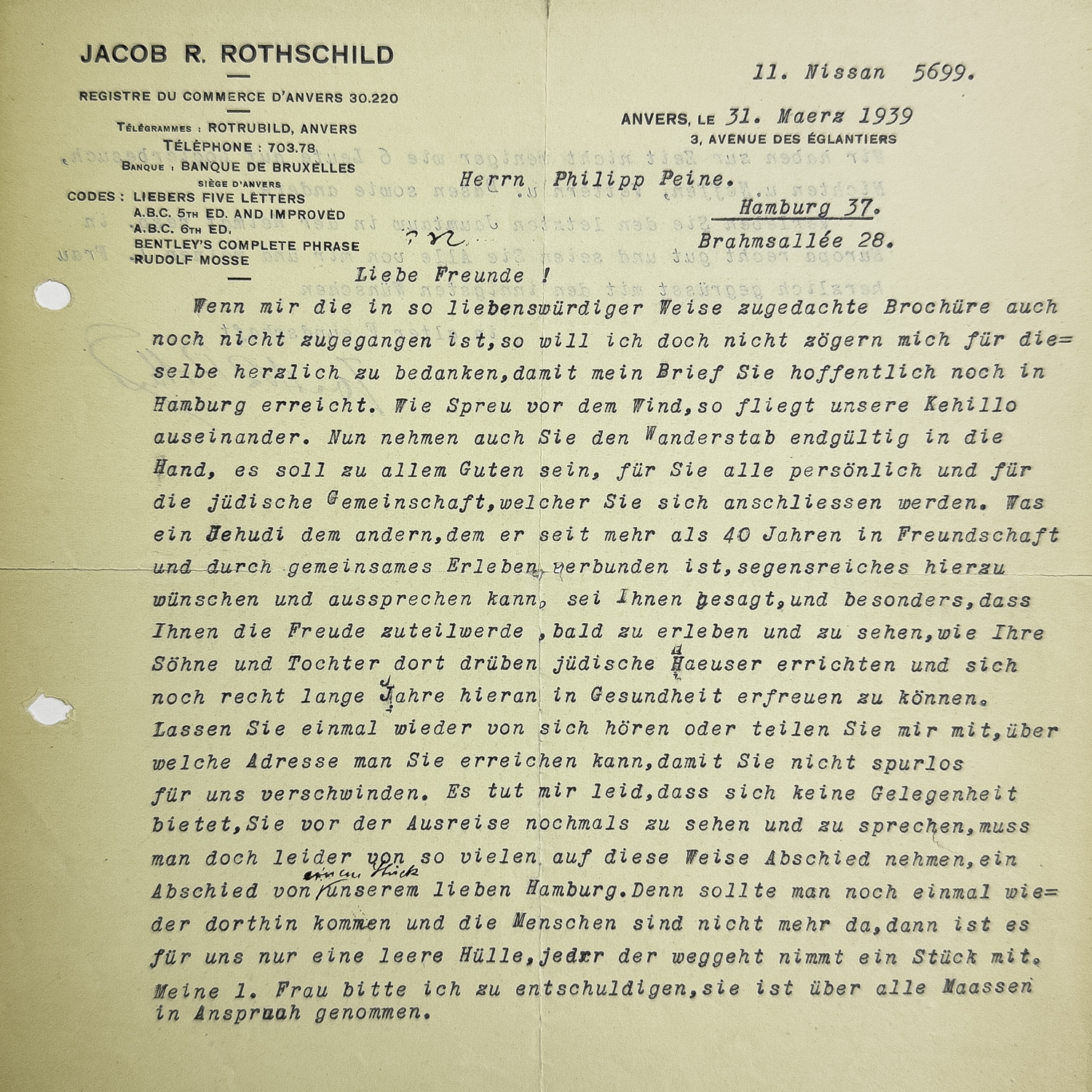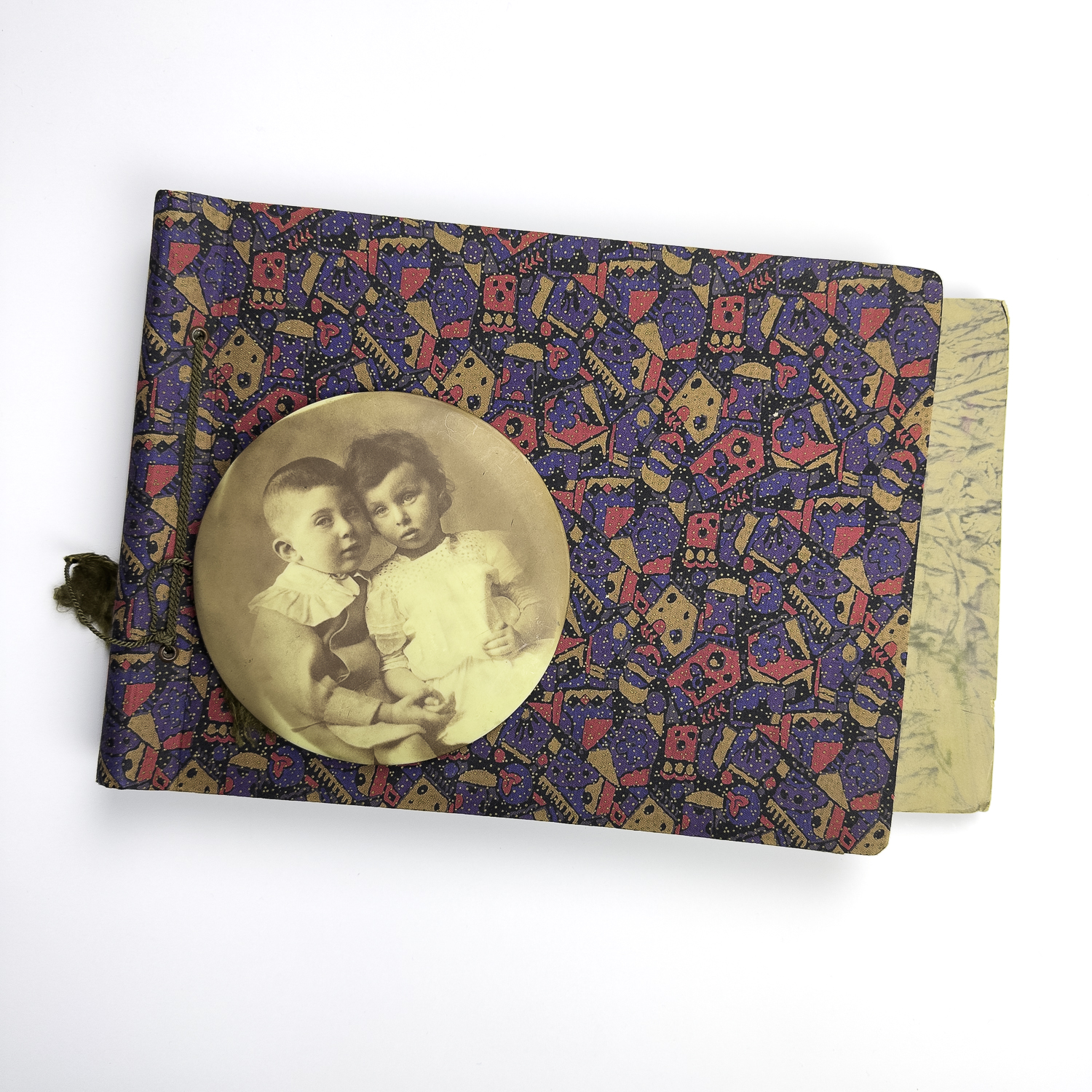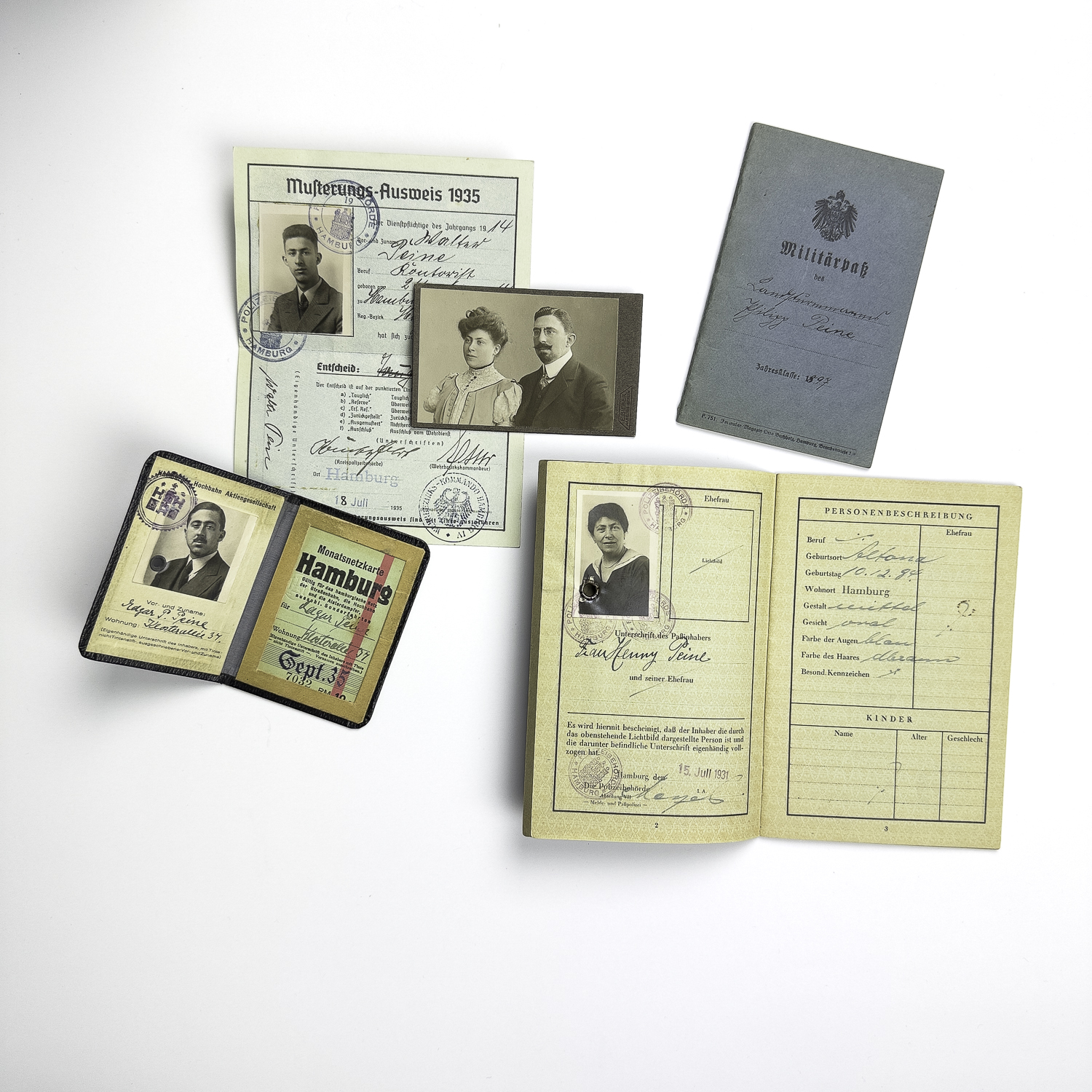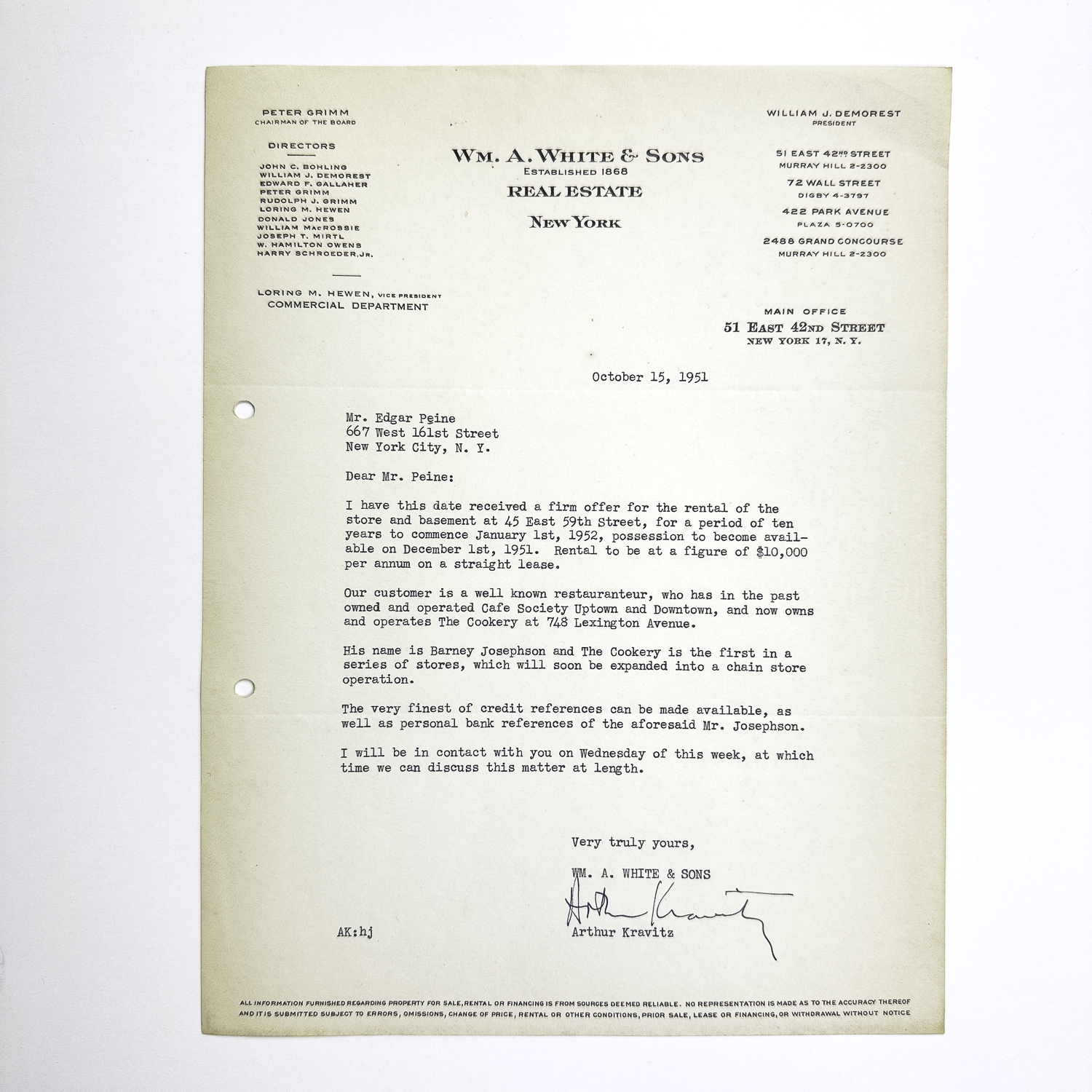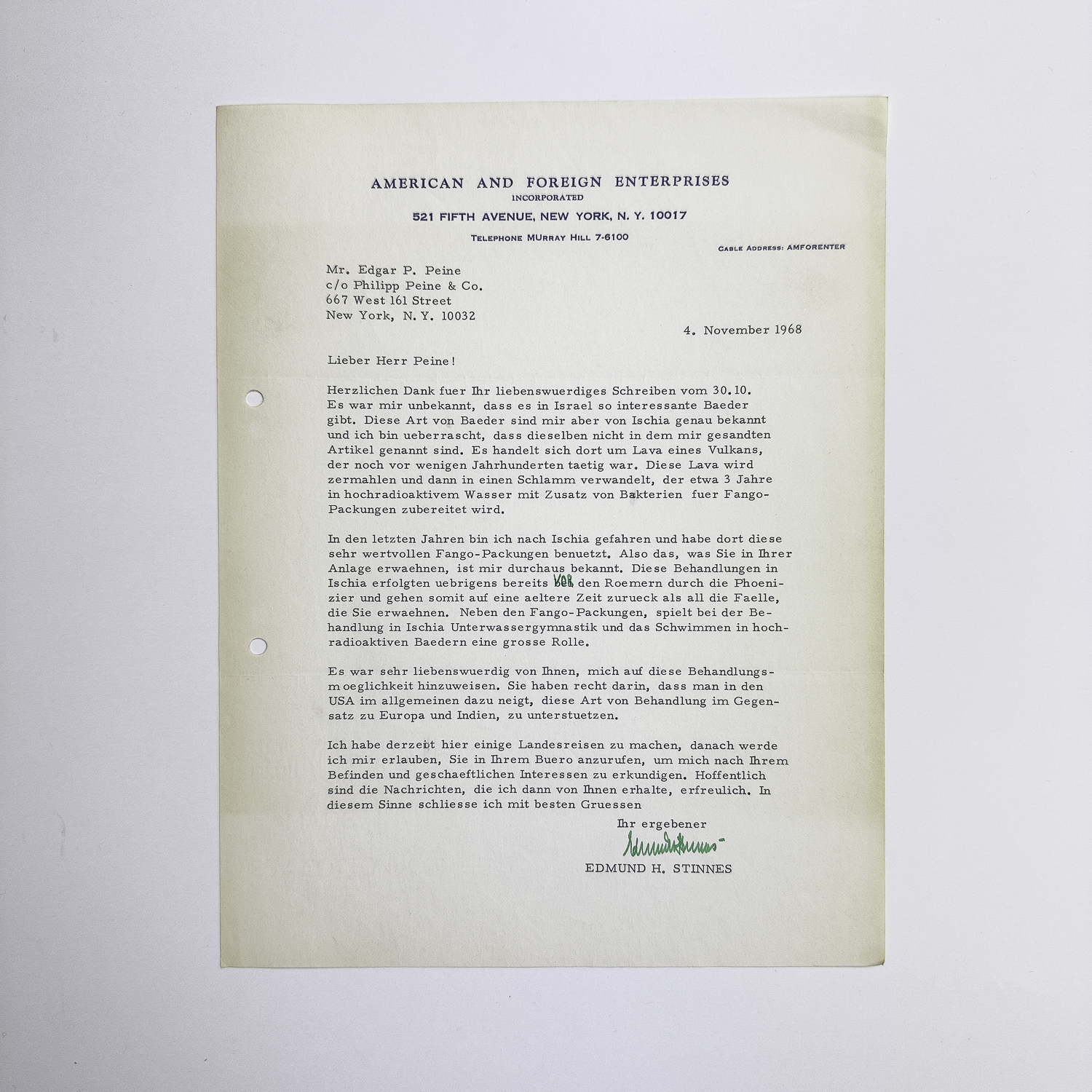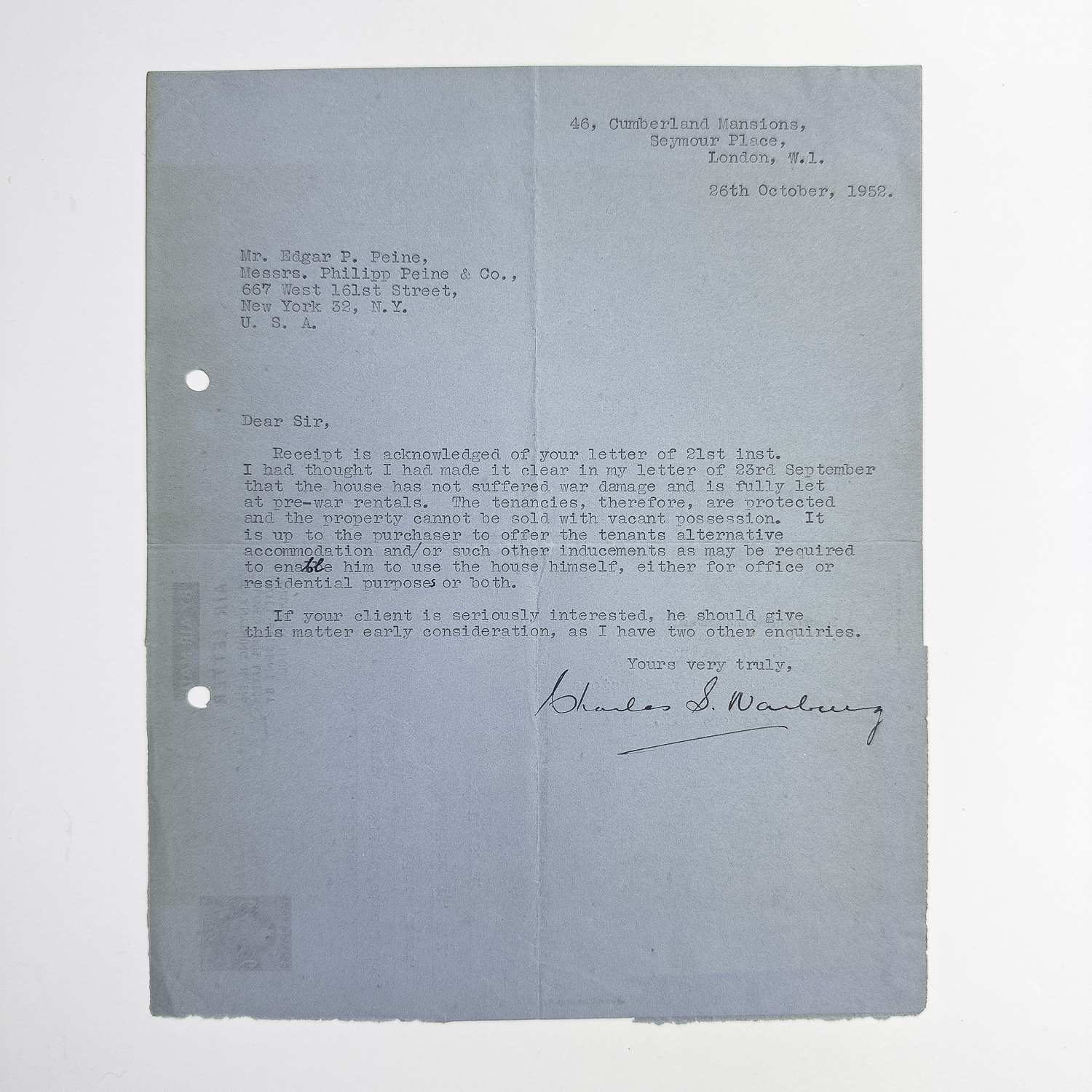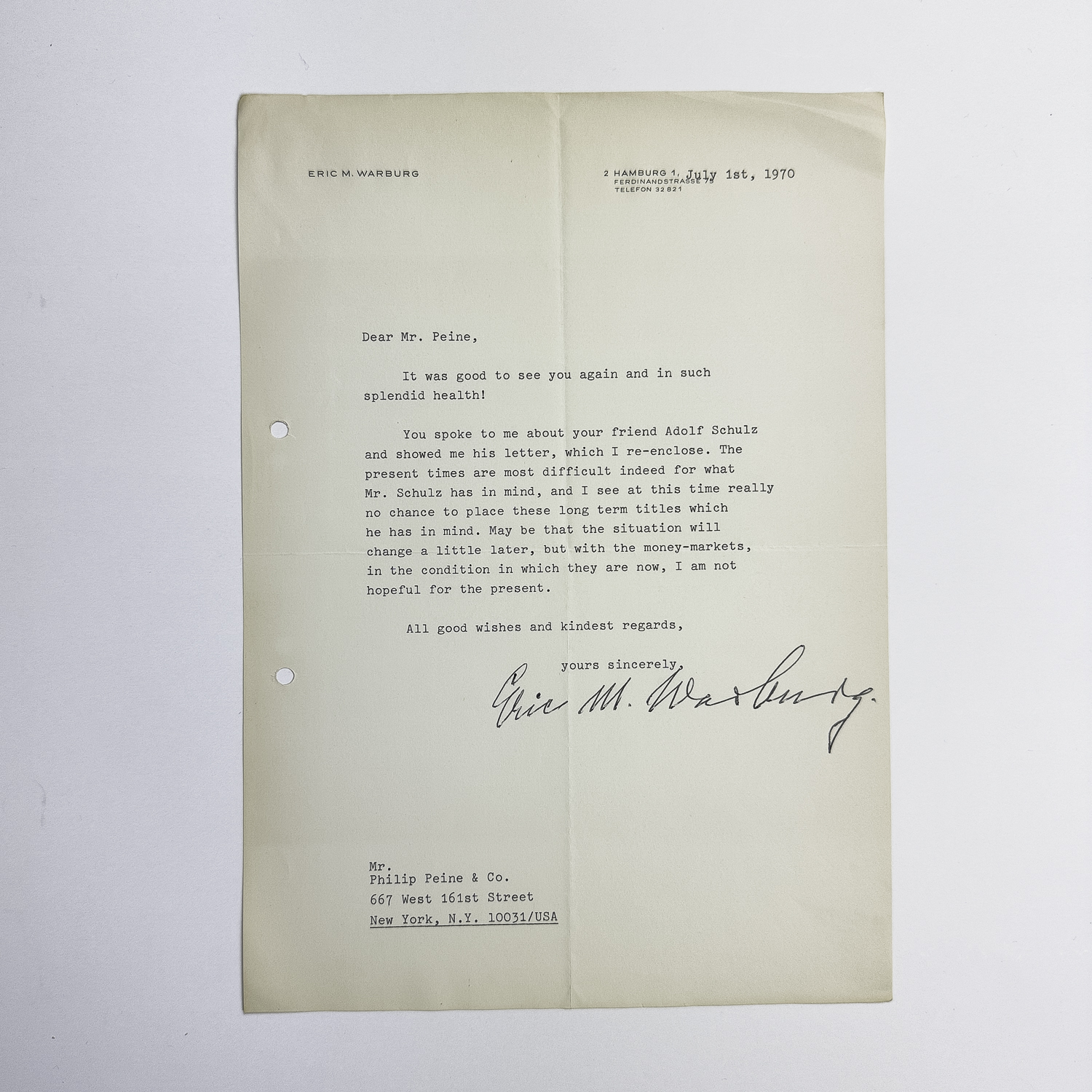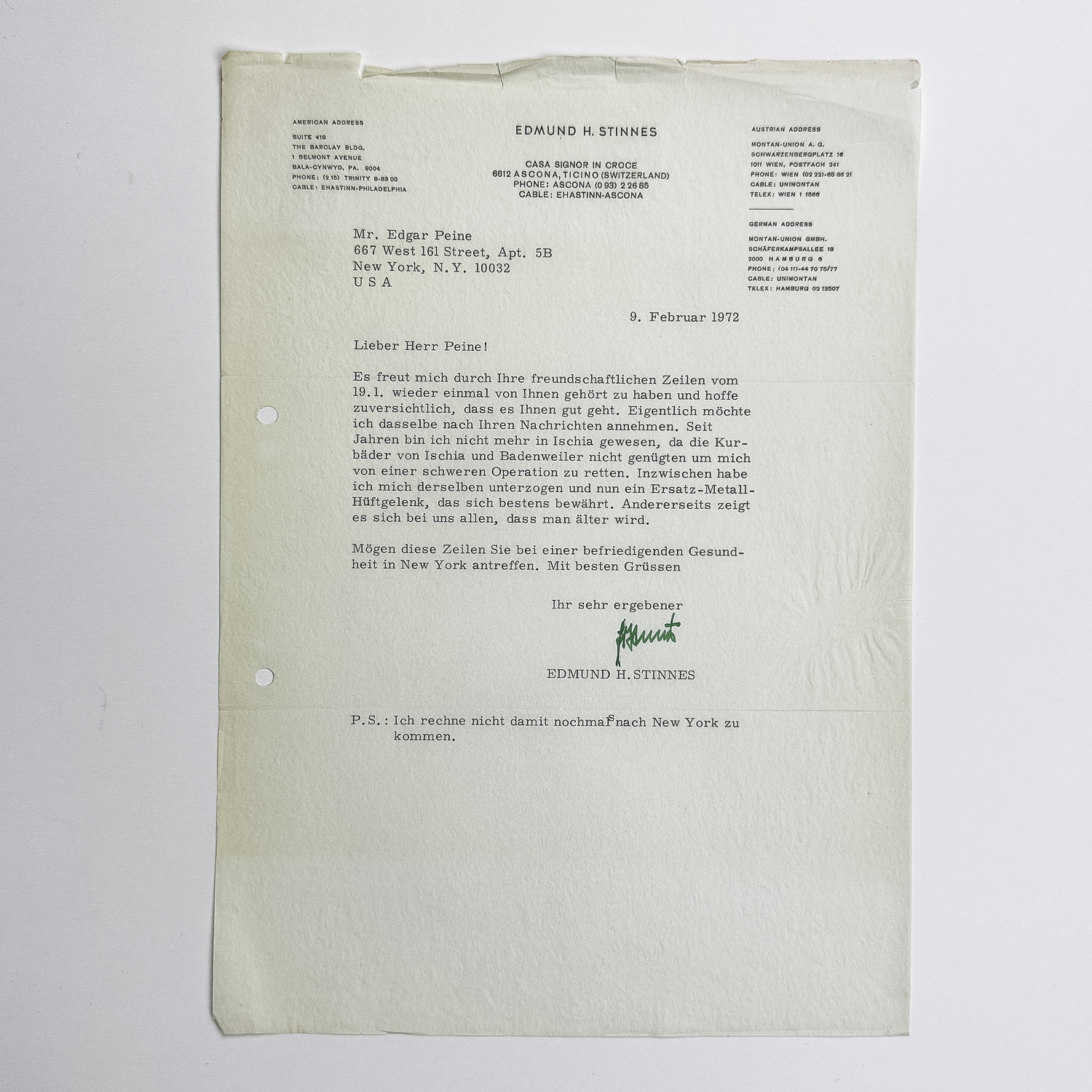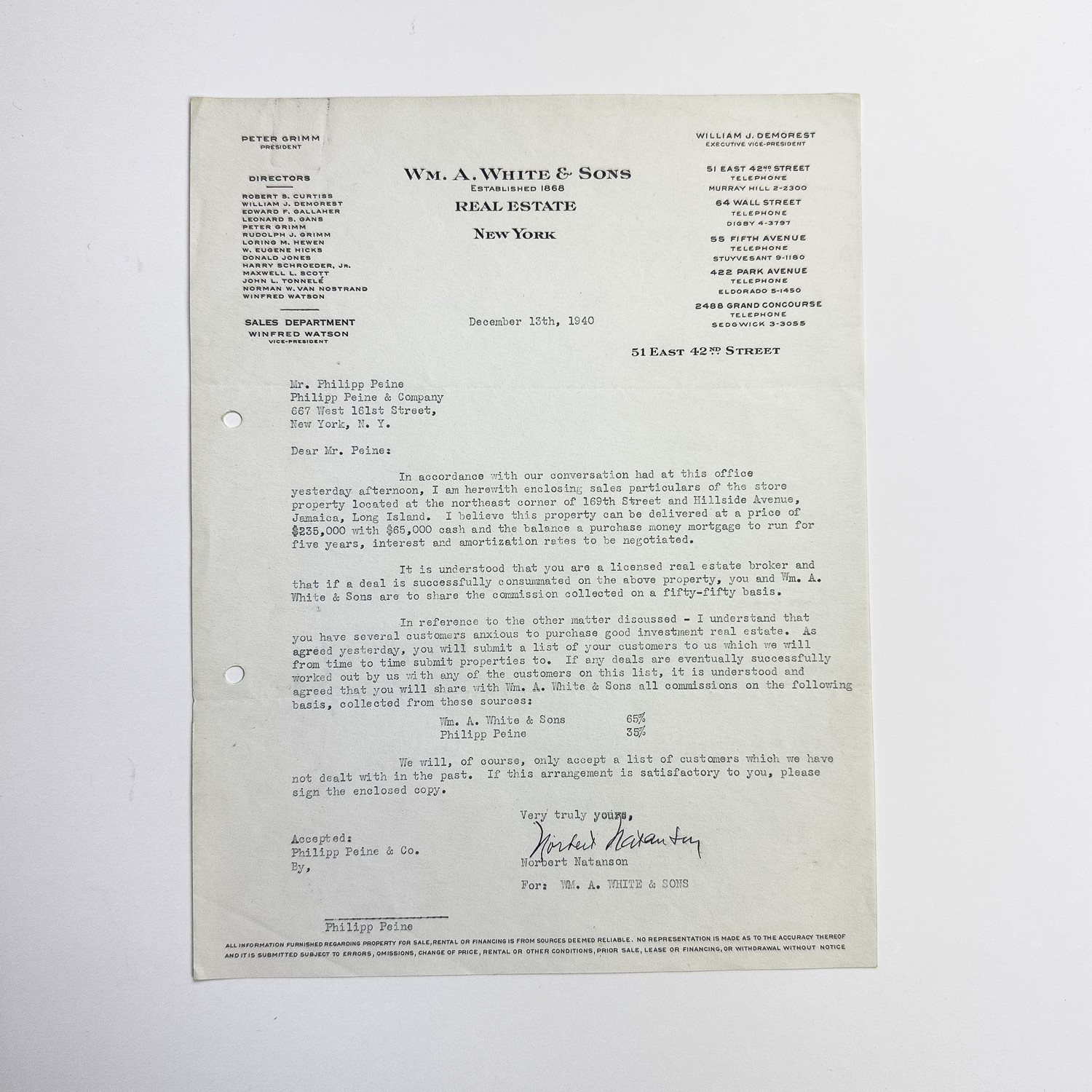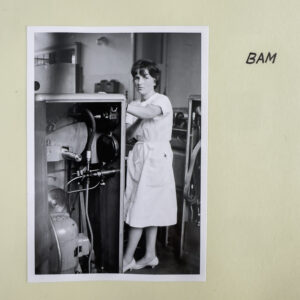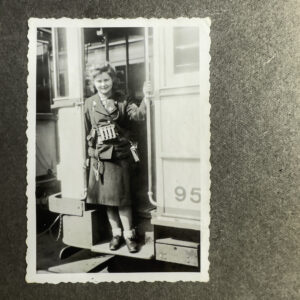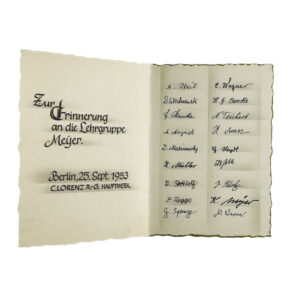Peine Family Archive: A German-Jewish Family active in international commercial real estate.
A collection of photographs and documents from a wealthy Jewish family active in commercial real estate around the globe. The documents focus on the 1930’s through the 1960’s and provide a first-hand account of Jewish life in Germany in the pre-war period; the process of fleeing Germany in early 1940 with as much wealth intact as possible; and then the build-up of a new life in commercial real estate in New York. The family developed a niche in international transactions of large German commercial properties that were returned to German-Jewish families after World War II. Jewish families fled Germany and, although their real estate was later returned to them because they had sold under duress, they were often no longer interested in keeping the properties and turned to the Peine family to facilitate selling the properties.
The scion of the family, Philipp Peine (born 1877) was a successful commercial real estate investor from Hamburg. He liquidated the family’s portfolio in the early 1930’s and assisted other Jewish families in real estate transactions prior to leaving Germany.
The magnitude of the real estate transactions is remarkable. For example, in December 1936 Philipp Peine corresponded with the Blitz family regarding an en bloc transaction of 85 Berlin apartment properties that grossed annual rent of 2,975,000 Reichsmark.
A Who’s Who of Banking and Commercial Real Estate Circles
When Philipp Peine emigrated, he contacted a who’s who of banking and commercial real estate families, and that correspondence is the heart of the archive. The business relationships established by Philipp Peine continued and thrived in the 1960’s with his two sons, Walter, and Edgar.
The archive contains letters from (and at times copies of letters to) the following banking and real estate magnates:
• Alexander M. Bing, New York real estate developer (and donor of land for parks);
• Frederick Brown, Jewish philanthropist and New York real estate investor;
• J. Clydesdale Cushman, the president and founder of Cushman & Wakefield, Inc – today one of the largest commercial real estate service companies in the world;
• Arnold Herzfeld, international insurance broker and the chairman and director of Bleichroder, Bing & Co.;
• Arthur Kravitz, at the time, a member of the New York real estate company Wm. A White & Sons;
• Norbert Natanson, a force in 1950’s New York real estate and at the time with Wm. A. White & Sons;
• Julius & Oscar Philipp, international metals traders and founders of Philipp Brothers;
• Jacob R. Rothschild, member of the Rothschild banking dynasty. In one especially poignant letter from Rothschild to Philipp Peine dated March 1939 he praises Peine for [‘finally taking up the wandering stick”] as Jewish communities are always forced to do and he recommends that Peine build [“Jewish houses”] in the United States for the sons and daughters of those fleeing Europe;
• Edmund H. Stinnes, the son of German industrialist Hugo Stinnes who was one of Germany’s wealthiest individuals;
• Ivan Salomon, New York investor and philanthropist (and who is described in a March 1935 letter to Philipp Peine as one of the wealthiest residents of New York and thus someone he needs to establish contact with);
• Max R. Schinkel, prominent Hamburg banker;
• Salmon Schocken, German-Jewish publisher and cofounder of the Kaufhaus Schocken department store chain;
• Fritz M. Warburg, the last and youngest of the famous Warburg banking family who also resided at the time in Hamburg;
• James P. Warburg, German-American banker well known as Franklin D. Roosevelt’s financial advisor; and
• Eric M. Warburg and Max M. Warburg – further members of the Warburg banking family.
The letters are generally business related; many are short and to the point – but others provide an extensive philosophical discussion of how to preserve wealth in a tumultuous world: [“It is a very difficult question; what one should do with investment proceeds in a world of today’s conditions…”] Should one invest in real estate, stocks, or bonds (and if bonds – should they be German, Swiss or American)? What really maintains value in a world beset with War and confiscation. The answer: [“Take action before the masses awake.”] And more concretely: no stocks of any kind and no German “investment paper”; Yes, to Swiss government bonds & commercial real estate that is free and clear of mortgages. January 1971 letter from Otto Hütteroth.
The Peine family was involved in major New York City real estate transactions. For example, a letter from August 1947 discusses the placement of a first mortgage on 300 Central Park West. A March 4th 1952 letter discusses a two-floor lease by the Singer Sewing Machine Company at 49 East 59th Street (a building apparently owned by the Peine family).
The camaraderie among Jewish immigrants to New York was established by their shared history of escaping Nazi Germany. The developer of major properties in New York, including 99 Wall Street, 170 Broadway, and 123 William Street (Elias Abraham (?)) wrote to Philipp Peine in 1939 seeking his investment capital:
“Therefore, with this tremendous fund of energy and with the clannishness of the Jew fixed here in the City of New York where he comprises more than one quarter of the entire population, he is a very important factor, and therefore, the business properties are the best ones in which to deal because that is where the Jew may be found and the Jew does not hesitate to pay rent if he does business.”
Pre-War Transactions
A particular pre-war transaction came back to haunt Philipp Peine in his new life in America. In March 1937, Philipp Peine facilitated the sale of three commercial properties in Hamburg that produced a gross rental income of over 60,000 Reichsmark a year. Peine represented Gustav Quarck, the owner of two tanneries in Germany, in the acquisition of apartment buildings. The same Quarck family founded the Chemtan Company in New York – a leader in chemicals for the leather industry to this day. Quarck wrote Peine in February 1949 informing him that the prior owner was demanding an unwinding of the transaction. On March 11, 1949, Peine responded to Quarck setting forth the realities of the time: Jews had to leave Germany; they had to pay a tax on their assets upon emigration, and this particular transaction occurred under these restrictions as was a given with all real estate transactions involving Jewish families. Given the circumstances, and the fact that all involved parties were represented by independent parties, the transaction was fair.
The post-war U.S. Military Government reversed the Quarck apartment building transaction, finding that the transaction occurred under “racial political pressure”. What happened after this initial reversal is not documented in the archive. We speculate it was merely the beginning of a legal battle.
Post-War Real Estate Transactions
After Word War II, numerous German real estate transactions completed prior to or during the war were overturned, and some Jewish families received their properties back. The Peine family specialized in these transactions. They facilitated sale transactions worldwide, finding buyers for high-end German real estate that had been returned to American Jewish families. The archive contains post-war correspondence with buyers of German commercial property in London, New York, Switzerland and Israel.
One example is the letters from the 1960’s between Edgar Peine and Hamburg restaurant owner and real estate mogul Manfred Katz. Katz is known for opening Israel’s first pizza restaurant and operating over 100 restaurants in Germany and Israel. The correspondence focuses on Katz’s efforts to sell his Hamburg commercial real estate to New York investors.
These post-war transactions were sizable. For example, the archive includes correspondence in 1965 pertaining to a commercial property known as the “Hamburger Hof” that sold for 8,800,000 Deutschmark. Edgar Peine also communicated with the Warburg banking family in London with attempts to sell Hamburg apartment buildings in the 1950’s.
A Religious Family
The Peine family frequently communicated with well-known Rabbis, such as Dr. Abraham Cronbach (1882-1965), a prominent pacifist Rabbi. There are copies of bar mitzvah speeches and much of the personal family correspondence is laced with quotes in Hebrew.
Providing Assistance to Jews Fleeing Germany
The archive documents Philipp and Henny Peine’s efforts to obtain exit visas for an Arthur Fleischmann out of Germany in 1941 (a relative of Mrs. Peine’s family). There is correspondence with other business owners seeking donations of $125 to help secure Flieschmann’s passage. Also in the collection are later letters of “thank you” from the Fleischmann family.
Discrimination
One letter in the archive details discrimination the Peine family faced in Hamburg. The letter is from August 1935, in which a neighbor threatens them with concentration camps: [“In Germany today there are facilities and consequences for people like yourself”]. The neighbor ends the letter taunting the Peines to go to the police and dares them to provide a copy of the letter to the authorities.
The archive provides a fascinating insight into the international commercial real estate market in post-war Germany and the efforts of a prominent Jewish family to escape National Socialism for a better life in the United States.
